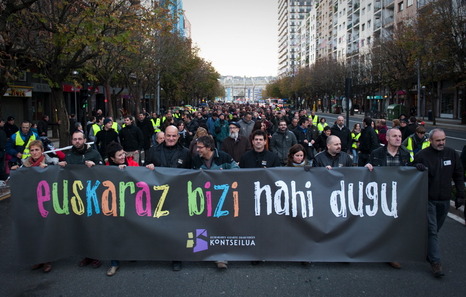Basque society, in general, does not esteem submissive postures (even less when they are the result of an unfair situation) and on numerous occasions has shown that it prefers insubmission, as when insubmission to Spanish military service was encouraged in the past. Nor do we like discriminatory attitudes. However at linguistic level, Basque speakers are discriminated against and we submissively accept that situation, even in the Basque-speaking towns of the Basque Country. It seems that we carry linguistic submission in the blood, also in the genes, since the two foreign imperialisms that we suffer have subjected us to a deep cultural and mental colonization. It is well-known that the oppressor’s most powerful weapon is the mind of the oppressed.
We mention insubmission because we see a reality that we don’t like: in Euskal Herria (the Basque Country) there is a “linguistic pax” because Basque speakers always give in to those who are not. There is no linguistic conflict here as in Flanders, Catalonia or Estonia because Basque speakers do not firmly demand our linguistic rights. What would happen if one day half of those of us speaking Basque (that is, some 400,000 people) refused to speak in Spanish (or in French)?. The conflict would surface in all its starkness.
In the Basque Country there are many Basque towns and counties in which the entire native population is Basque-speaking, as in Estonia (with their language), for example. But even in these villages it is impossible to live life through Basque because the settlers who are there impose their linguistic dictatorship on us. And in that case the fervent defenders of “tolerance” and “multiculturalism” ask Basque-speakers for linguistic submission to facilitate coexistence. That is not fair.
The defenders of Spanish or French also remind us that Basque speakers in the Basque Country, represent only one third of the population at most. And that is only half true. In the regions of Urola Kosta or Lea-Artibai, for example, despite the fact that the majority are Basque-speaking, they also require linguistic submission. And also there in the notary’s office, in the courts, in many banking entities, in the Employment Service, in the public medical services, in some restaurants or in the offices of the Ertzaintza (Basque Police), for example, we are obliged to speak in Spanish to avoid “conflict”, to demonstrate a “good education.”
The time has come to speak clearly. The time to say that enough is enough! It is not our intention to be politically correct, rather to make a true diagnosis of the situation we suffer: Euskal Herria is a linguistically and culturally colonized nation, and forgetting that makes us fall again and again into linguistic “goodism”. We are in such an advanced phase of linguistic assimilation that it seems “normal” to speak in Spanish to a citizen who lives here and does not know our language, whether because he is born outside, because he is one of our own, because he is our neighbor or because we want to avoid the uncomfortable effects of “linguistic stress”.
If, at the individual level, we adopt this position so submissive and docile, how are we going to demand from the Public Administration more courageous and bold attitudes in the field of linguistic policy?
Rights are not begged, rights are put into practice. Basque speakers and Basque language activists have to leave the closet and demand our linguistic rights. End linguistic submission. Recover our individual and collective dignity. Because we are not Basques, we are Euskaldunak (*). And we are not willing to repeatedly surrender our identity.
Basque society has made great progress in recent decades in raising awareness of our collective rights. We consider discrimination against women, or discrimination against a particular race or ethnicity to be unjustifiable. But the same does not happen in the linguistic field. It is time to claim to be able to live through Basque in Euskal Herria, because using one’s own language in our country is not a privilege but rather an expression of social dignity. Living through Basque in the Basque Country should be the most natural thing corresponding to the Basques.
Lastly, we wish to highlight the importance of reporting. When someone breaches our linguistic rights, we should not accept the discrimination status, but denounce it. We select two avenues for the purpose, i.e. Elebide, in as much as it is an official agency in the Basque Autonomous Community, and the language watchdog Behatokia, since it is organized by Kontseilua and deals with the whole Basque Country. In addition, we report not only the infringements carried out by public bodies, but also organized private entities, like banks, restaurants, trade companies, or any other. We are not prepared to see our civil rights, including linguistic ones, crushed once and over again.
Individual gestures can be the starting point of a social revolution (remember that of Rosa Parks on that Alabama bus). Now is the time for linguistic insubmission.
(*) Note. In the Basque language, Basque-speakers are called “euskaldunak”. “Basque” (Vasco) is used in Spanish to describe the people but is a collective word that includes both Basque- speakers and those who are not.








